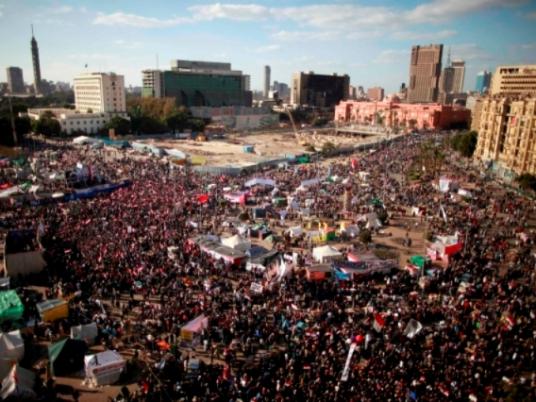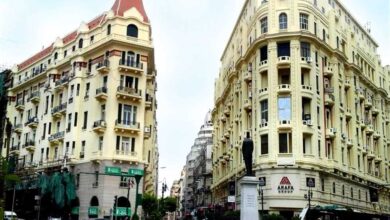
For the first time since the one-year anniversary of the 25 January uprising, Tahrir Square will again become a unifying point for varying and increasingly conflicting ideologies.
With the Muslim Brotherhood's Freedom and Justice party announcing its intended participation in what was originally a demonstration called for by secular movements — partially in protest of the Islamists' takeover of all political institutions — and supporters of firebrand ex-candidate Hazem Salah Abu Ismail already erecting a stage in the square, anticipation for Friday's gathering may be high, but expectations are considerably less so.
Called for by the April 6 Youth Movement and the Revolutionary Youth Coalition, the 20 April protest will revolve around a familiar list of demands; namely, the reformation of the Constituent Assembly to include representatives of all walks of Egyptian society, and the cancellation of Article 28 of the military's Constitutional Declaration, which states that the Presidential Elections Commission operates independently and cannot be held accountable by a judicial authority. Moreover, protesters demand that the military council hands over power as planned, an issue that is not taken for granted given the ongoing political instability.
The protest had also been planned as a response to the presidential bid of Omar Suleiman, former chief of intelligence and, later, vice president to toppled tyrant Hosni Mubarak. However, Suleiman has since been disqualified, as were the Muslim Brotherhood's main candidate Khairat al-Shater, and Salafi cleric Abu Ismail — exclusions that some fear may overtake a protest originally planned by secular forces.
"We are calling for unity. Friday's protest will see large groups of people coming to Tahrir from all over the country," hopes Mahmoud Afify, a spokesperson for April 6. "We're trying to find a common ground, which is what this Friday is all about."
"We reject the military council’s interference in the writing of the constitution. This is what we need to unite for. It would be wrong, not to mention dangerous, for any group to take advantage of the mass gathering to support a candidate," Afify says, referring to growing fears of having Friday's planned protest hijacked by supporters of Shater or Abu Ismail — especially given the lengths which the latter has gone to incite his followers.
Instead, Afify believes all efforts should be focused "on the fight ahead," meaning inevitably going head-to-head with the SCAF over what kind of country post-revolution Egypt will become. Field Marshal Hussein Tantawi’s meeting with political party heads last year, whereby he insisted the constitution should be finished before a president is elected, has raised alarms. For many revolutionaries, no constitution should be drafted or influenced by the military junta. Some are worrying that Tantawi’s insistence on the constitution first may mean the postponement of the power handover to a civilian authority.
Regarding Friday's protest, Afify remains hopeful that, somehow, common sense — as defined by the April 6 movement — will prevail: That the day will bring street politics and popular pressure back to the political equation.
Others are not as optimistic.
"For things to change, the Brotherhood needs to reconcile with the people," states political analyst Akram Ismail, who believes that, in the months since parliamentary elections, the public's faith in the Brotherhood has taken a nosedive. "Their popularity is at an all-time low, and they're alarmed that the political Islamist current is forming around two candidates that are not part of their organization," he says, referring to Abdel Moneim Abouel Fotouh and Mohamed Selim al-Awa.
Like Afify, Ismail believes that the FJP's decision to join the 20 Friday protest is a step forward — if only in theory. "Bringing the power back to the street is the right way to go — patching up the divisions that the past year has caused."
Key to this is the fact that "the military council is not afraid of the Brotherhood. But they are afraid of mass uprisings, which can only come through the people," according to Ismail.
Should the Brotherhood take to the streets on Friday to chant for the injustices committed by the SCAF against Shater, they will have "proven, once again, that they are just taking advantage of the revolution and the people's commitment to it to further their own interests." If that happens, Ismail insists, there should be no reconciliation.
That might be asking too much.
"What reconciliation with the people?" demands Brotherhood spokesperson Mahmoud Ghozlan, taking obvious offense at the mere suggestion. "We are the people."
According to Ghozlan, the Brotherhood's perspective is — unsurprisingly — at odds with Ismail's analysis. "Yes, there has been minor disagreement on some issues between us and the different parties and movements currently on the scene," Ghozlan admits, before dismissing such arguments. "I know nothing of the actual details," he says, "but now, our demands are the same as everyone else's. We are calling for an immediate hand over of power, and for measures to ensure that members of the deposed regime will be barred from rejoining the political scene in any capacity."
"We need to protect the constitution from being hijacked by outside forces," states Ghozlan, without a hint of irony.
Addressing fears that the FJP's participation on Friday will revolve around championing their disqualified candidate, Ghozlan insists, "Despite the great injustice and illegality of the exclusion of Khairat al-Shater, we have decided to accept the situation and move on."
Seen in this light, Friday seems not so much the turning point that many have been calling for, but rather, an opportunity for one. For now, Friday's players seem to be on the same page. Whether the same can be said by the end of the day remains to be seen.
"The Brotherhood needs to understand that the revolution failed because of them and their insistence on using the people as a bargaining chip in their power deals with the SCAF," says Ismail. Unless sincere in its calls for "reclaiming the revolution," the Brotherhood's return to the street could actually deal a deathblow to street politics, irreversibly dividing an already heavily fractured front.




